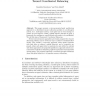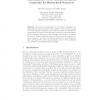100
click to vote
ALDT
2009
Springer
15 years 6 months ago
2009
Springer
We study the problem of allocating a set of indivisible goods to a set of agents having additive preferences. We introduce two new important complexity results concerning efficienc...
125
click to vote
MAAMAW
1992
Springer
15 years 6 months ago
1992
Springer
This paper presents a microeconomics-based equilibratory approach to a distributed resource allocation problem in a multi-agent system. In a multi-agent system, each agent has its ...
134
Voted
ALDT
2009
Springer
15 years 6 months ago
2009
Springer
Abstract. We study a model in which a group of agents make a sequence of collective decisions on whether to remain in the current state of the system or switch to an alternative st...
107
click to vote
SIGECOM
2010
ACM
15 years 7 months ago
2010
ACM
The Combinatorial Public Projects Problem s an abstraction of resource allocation problems in which agents have preferences over alternatives, and an outcome that is to be collect...
116
Voted
GLOBECOM
2006
IEEE
15 years 8 months ago
2006
IEEE
Abstract— For multi-user orthogonal frequency division multiplexing (OFDM) systems, efficient optimal rate and power allocation algorithms are presented via geometric programmin...
CPAIOR
2007
Springer
15 years 8 months ago
2007
Springer
Abstract. We propose generalizations of the Global Cardinality Constraint (gcc) in which a partition of the variables is given. In the context of resource allocation problems, such...
124
click to vote
INFOCOM
2007
IEEE
15 years 8 months ago
2007
IEEE
— A systematic approach to solve seemingly nonconvex resource allocation problems in wireless cellular networks is studied in this paper. By revealing and exploiting the hidden c...
SAGT
2009
Springer
15 years 8 months ago
2009
Springer
In this paper we study a large class of resource allocation problems with an important complication, the utilization cost of a given resource is private information of a profit ma...
100
click to vote
ATAL
2009
Springer
15 years 8 months ago
2009
Springer
Multi-agent resource allocation is a growing area of research at the frontier between Economics and Computer Science. Despite the extensive theoretical work and raising number of ...



